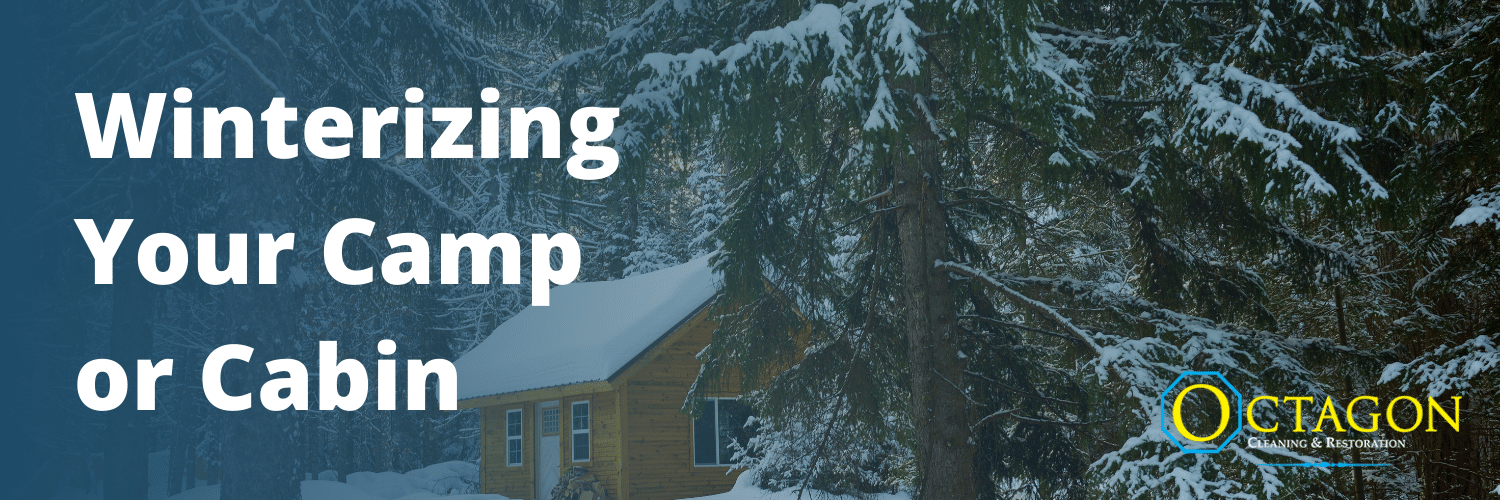
As temperatures begin to drop, it’s time to close and winterize your camp or cabin for the season. Various issues can develop over the winter season if you don’t do it properly. Let us discuss some of the potential problems and go over some steps to take before shutting the doors for the season.
Avoid Frozen Pipes
To avoid pipes from freezing in your camp or cabin, you will need to drain the pipes. Here’s one way you can do it:
- Shut off the water supply.
- Open the faucets and hose bibs to drain the freshwater systems and leave them open to prevent building pressure.
- Flush the toilets to get most of the water out of the tank and the bowl.
- Turn on the shower to remove the water from the pipes.
- Turn off the water supply to your refrigerator, drain the lines, and discard the ice from the reservoir.
Try Using RV Antifreeze:
- Fill your sinks and tub drains. Add enough to ensure that you have filled the u-shape trap beneath your sink or tub.
- Add some to your toilet tanks and bowls adding, enough RV antifreeze to ensure that they will not freeze.
- Dump some inside your washing machine and dishwasher.
Draining and winterizing the appliances, fixtures, plumbing, and heating systems are some of the most critical steps in closing-up camp for the winter. Unless you are trained and experienced in winterizing plumbing systems and have the proper tools and equipment, some water will remain and freeze. This water will be in the lowest areas. These areas include toilet tanks and bowls, sink/tub drains, and appliances.
One way to prevent any remaining water from freezing is to add RV antifreeze to the system. RV Antifreeze is non-toxic and safe to use in plumbing systems. Please note when reopening your camps or cabins, you will need to follow the specific steps to remove the RV Antifreeze from the system before you start using or drinking the water. Please read and follow the instructions on the label.
If you don’t feel comfortable winterizing your property or are unsure how to do it, we recommend calling in a professional specializing in winterization.
Prevent Roof Leaks
Roof leaks can cause significant damage at any time of year, but winter is when you want to make sure your roof is ready to weather the season.
Here are a few ways to prepare your roof for rain, snow, and ice:
- Check the roofing materials to ensure that they are not lifting, cracked, or damaged in any way.
- Sweep and remove any debris that is on the roof. This debris includes leaves, pine needles, or any other materials that can trap or hold water from draining.
- Check around roof penetrations such as pipes, wires, and chimneys to ensure that the gaskets, flashings, and caulking is sound and free from cracks or defects.
- Clean your gutters so water can run off the roof unobstructed.
- Cut back any branches that are hanging over to help prevent them from coming down onto the roof.
Remove or Store Dry Food Properly
Believe it or not, food can damage your camp or cabin even in winter if left unattended. How can food cause damage?
- It can spoil or rot on surfaces leaving damage and odor
- Canned food can freeze or burst, attracting bugs and rodents.
Discourage Rodent Intrusion:
Rodents are a real issue in camps or cabins during winter. Rodents looking for a warm place to nest can get into food left behind and chew on exposed wood or wires. For some rodents, it only takes a crack that is 1/4 inch in size to be able to get through.
Here are a few ways to avoid rodent infestations:
- Cleaning before closing for the winter:
- Vacuum under couch cushions, behind ranges, and refrigerators.
- Clean and wash cabinets, refrigerator, appliances, countertops– anywhere food is stored.
- Wrap or protect soft goods such as couches, mattresses, clothing, bedding.
- Seal up cracks, crevices that are ¼” or larger.
- Openings around pipes and wires using steel wool
- Putting wire mesh over vent pipes and chimneys
- Sealing up cracks around windows and doors
- Fix cracks in and around foundations
Deter Potential Break-Ins
A break-in, theft, or damage to our property would be a violation. While it’s almost impossible to stop someone from breaking in, there are ways to make it less inviting.
We recommend taking the following actions when closing-up for the winter.
- Clean up the property and store outdoor furniture, boats, vehicles, etc.
- Remove anything valuable, including televisions, jewelry, toys, etc.
- Use deadbolts or padlocks to lock the building, sheds, and garages.
- Secure windows and doors.
Avoid Water Damage and More By Properly Winterizing Your Cabin
Camps come in many shapes and sizes, some do not have power or running water, and some have all the comforts of home. Depending upon the camp or cabin, you will determine what you need to do to get prepared. Be diligent when winterizing as it can protect your investment and save you hundreds– if not thousands of dollars–in repairs so you can keep enjoying time at your camp or cabin.

